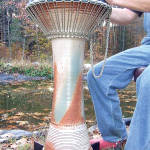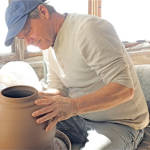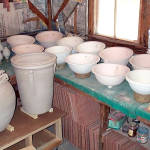Rusty Wiltjer — Making it as an artist in rural Maine
- WORK OF ART — Rusty Wiltjer’s process in creating a hand drum like this one took about three years from its prototype to finished stage. “When something leaves here it is functionally and artistically the best I can make it,†he said.
- CONNECTING WITH THE SELF — Clay is a very tactile material and can help people get in touch with their emotions, said South Waterford potter Rusty Wiltjer, who is offering classes in his studio for the first time this spring.
- CLASS TIME — Classroom stations will replace the unfinished sinks stacked on counters inside Wiltjer’s studio in South Waterford.
By Gail Geraghty
Staff Writer
SOUTH WATERFORD — His formerly robust production of high-end whimsical sinks is down to next to nothing. Jigs for his signature fish “Chain of Life†wind chimes, which were sold the world over, lay gathering dust in his studio on Route 37.
Some have wondered lately whether Rusty Wiltjer has gone out of business.
But, no, the well-known local potter isn’t done with the Chain of Life, or his business, Wiltjer Pottery. He’s operating as he always has, doing his art for the love of it, not for the money. He’s made tons of money. But at every point where it started to become more about the money than the art, things started to go wrong, and he walked away — choosing to reclaim the heart in his art.
“I don’t consider myself a business person or a marketing person. I just do what makes sense,†said Wiltjer, who, a decade or so ago, turned down a deal by Coldwater Creek to have the slabwork for his fish farmed out to a pottery outfit in New York, in order to tap the Asian market. All through the ‘90s, he did huge orders and had five full-time employees that did nothing but produce fish for the national catalogue retailer.
“I’d go there, oversee everything, and just get a check. And I said no. It’s my design, and nobody else is going to make them,†he recalls. “It wasn’t one of my better business decisions.â€
Still, he doesn’t regret it.
“I can’t answer the question of would it have been better (had he become the business manager of his art, instead of the artist) because I don’t know. I definitely wouldn’t be who I am now. My guess is, I wouldn’t like it — but I might just be saying that to make myself feel better.â€
Beat of a different drummer
Right now, his gigs as a drummer, and the ceramic hand drums he’s been creating for the past five years are his passion. But the drums spent years in the prototype stage (“When something leaves here it is functionally and artistically the best I can make itâ€). And the market for the beautiful drums is but a fraction of what he enjoyed for his custom sinks — which everyone needs, after all. At one time he was going through a ton of clay every three weeks, and he was making around a dozen of them a week. Barely keeping up with orders, he was on the verge of building a new road into his 25-acre studio/home, and erecting a new, much larger studio, when he took a trip to Hawaii, met a potter working in the open air, and realized, “there’s other climates on this planet.â€
The sinks were lucrative, but he began to struggle with the making of them. “They were really good money, and I didn’t want to do them for the money. So things started going wrong, and when that started happening I know it’s a sign for me†to return to doing his art “for the love of it, like I usually do.â€
He brought the project to a halt, started cutting off his sink orders (Home Depot and others had started to create custom sinks and his clientele began to resemble “trend-chasers,â€) and began migrating into the drums.
“I’ve gone from thousands of people with money to a few people with no money — and then slap a bad economy on top of that, and I’m eating bread again, you know what I mean?â€
He’s determined to stick with the drum-making until it fully takes hold. But to supplement his income until he can sell his drums on the road at summer music festivals, he will do what makes the most sense — he’ll teach.
“I’m pretty frequently asked if I do pottery classes, and I say no because I don’t have the space,†he said. “Now my production’s down. I have the space. And I need the money.†He is offering once-a-week pottery classes for five weeks at $25 a class, plus $50 for materials — a bargain, considering his level of mastery.
Connecting with the clay
Get ready for an interesting experience if you take classes from Wiltjer, who sees the making of pottery as a path to self-knowledge. Clay is a very tactile thing, he says, and when a person first starts to work with it, it can be an emotional experience.
“You’re touching this clay and you’re forming something with it, and there’s some kind of a connection that takes place with yourself. It’s sort of like plugging in a circuit. And people feel that.â€
Wiltjer discovered that for himself over 40 years ago, as a student majoring in ceramics at Ohio State University in 1970. He said he was hooked the first time he sat at the potter’s wheel. “My first class, I slapped the clay on the wheel and said this is what I’m going to do. It was that immediate.†But even though he had loads of enthusiasm, mastering “throwing†took a lot of hard work.
“I’d go in after class and work at it, and work at it,†said Wiltjer, who describes his style as “focused and intense†when he’s learning a new skill. “The teacher would make us do 50 cylinders of a certain height and certain diameter. And he’d go in and measure and if they weren’t right, he’d take a wire and slice them all, and say, ‘do over’.â€
The potter’s wheel isn’t for everyone, said Wiltjer, but he’ll gladly teach it to someone who wants to learn.
“I basically look at what they want to get out of it. If they are there to experience the clay and just connect with it, whether or not they do something technically correct really won’t matter. In either case, we’ll need to make sure it will fire okay.â€
Handbuilding, rolling, slabbing or cutting with clay can be just as satisfying as working with the wheel, said Wiltjer. “There’s no room for competition in the arts. Art is, by definition, no more than the expression of one’s inner being. You can’t judge that.â€
People who Wiltjer has taught before, at Bridgton Academy, in his daughter’s classes, at a Waterford boys’ camp, are as a rule “very enthusiastic people, and so they’re fun. They want to be there.†He’ll tailor the classes to individual needs — whether it’s just to experience the clay or to become a potter capable of producing technically correct pieces. They’ll go away with at least one finished work. He believes that in art, as in life, people need to set their own rules for themselves.
“Choices are being made for us every day and we give in to them,†Wiltjer said. “Me, I love being covered in clay — that, and playing my drums.â€
For more information on Wiltjer’s classes, call him at 583-2911, or visit www.wiltjerpotter.com




